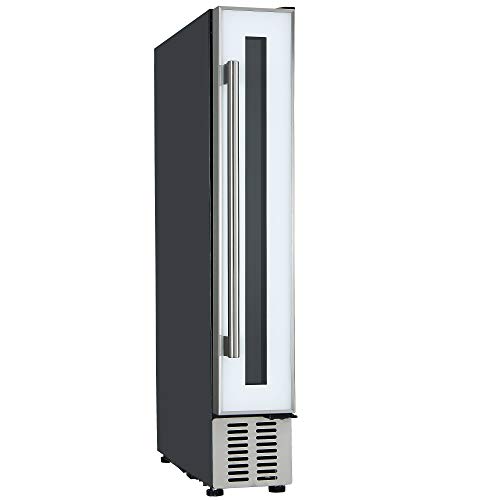



Foro
About Me
Choosing a Beverage and Wine Refrigerator
 This dual-zone refrigerator is ideal for cooling and storing both wine and beer. It can be freestanding or built-in, and comes with an aesthetically seamless door that is able to fit into any space.
This dual-zone refrigerator is ideal for cooling and storing both wine and beer. It can be freestanding or built-in, and comes with an aesthetically seamless door that is able to fit into any space.
While vibration is generally safe, it can disturb the sediment of a bottle and cause complex chemical reactions that are not evident. In time, this may reduce esters and produce dull flavors.
Humidity Control
Humidity is the quantity of water vapor in air. It fluctuates throughout the day because of a variety of factors. Temperature, precipitation and wind can all have an enormous impact on humidity levels. Achieving the right level of humidity is important for a number of reasons. Humidity can affect weather patterns, indoor air and even wine storage. The delicate wine's composition contains many aromatic compounds that are sensitive to changes in humidity. The wine's flavor can be affected by high humidity. It can alter the balance of these aromatic compounds. A wine refrigerator can help maintain the right humidity level to preserve the wine's flavor.
A wine fridge can also aid in preventing the deterioration of corks and ensure that the seal is intact. If the humidity is low, corks may dry out and let oxygen enter the bottle, which can accelerate the process of aging and tainting the wine's flavor. A wine refrigerator can help maintain the humidity level between 55% and 75%.
While a wine cellar is intended for long-term aging wine coolers can provide ideal storage conditions for both beer and wine. These coolers usually have dedicated spaces for beer bottles so that you can store your favourite craft beers or lagers right alongside your favorite wines. These units are designed to regulate the humidity and temperature in order to prevent condensation, which can damage labels and packaging.
Most models have a hygrometer that lets you monitor and adjust humidity levels in your wine cooler. You can use an air humidifier inside your wine refrigerator to boost the humidity.
If you opt to use a wine fridge, place the dehumidifier in a room separate from it. This will stop the dehumidifier from absorbing any of the beer or wine refrigerator small you keep in the refrigerator. If you intend to store your wine for a long duration, controlling humidity is vital. For a brief period of time, you may not notice any changes in your wine, however over time an absence of humidity can significantly alter the taste of your wine.
Vibration Absorption
Vibrations in the wine refrigerator can interfere with the natural aging process of wines stored in it. Even small vibrations can trigger agitation in the sediment in the bottle and trigger intricate chemical processes that will diminish esters and diminish the wine's flavor with time. In order to protect your precious wine collection, all La Sommeliere units are equipped with a special vibration absorption system that significantly reduces the impact of tremors and noise. It also ensures that your wines age properly and quietly.
Despite the fact that wine refrigerators generate less sound than normal fridges, the fan and circuits for refrigerant used in a variety of units are still susceptible to producing noise. It is for this reason that it is crucial to follow the clearance guidelines when installing your wine cooler and to place it in a quiet location far from any other sources of disturbance.
It is also recommended to clean your wine cooler regularly with a nonabrasive cleaner and let it "air out" for a few minutes before loading it with bottles. This will help reduce dust and dirt that may accumulate in the air vents.
Finally, if you notice that your wine refrigerator is producing excessive noise, it may be due to an electric fan that isn't working or compressor. The compressor is typically situated behind the wine fridge. If it is positioned unevenly or is struck by something behind it, it could shake itself free from its rubber mounts, which can cause loud humming noises.
The compressor wine cooler works as a normal fridge, compressing air molecules electronically, which lowers their temperature. They are then blown across the interior of your refrigerator. This type of cooling is more energy efficient than other cooling methods, such as evaporator or frost-free refrigerators. The drawback of compressor wine coolers is that they require frequent repairs and tend to create more noise than other types of refrigerators. Because of this, many people opt to purchase thermoelectric wine coolers that don't use compressor systems.
Control of Temperature
Beer, like wine, requires specific temperatures to ensure its flavor is maintained. This is why it's crucial to select a wine and beverage fridge with temperature controls that can be adjusted to ensure that you keep your drinks at the perfect temperature for serving and storage for each type. Dual-zone models are available with separate temperature zones for wine and beer bottles.
Generally speaking, the majority of beer types prefer to be served colder than wine. The ideal temperature to serve a particular type of beer will depend on the style and how it was made. For example, wheat beers and pilsners are best enjoyed between 40 and 50 degrees Fahrenheit, and IPAs, sours and barleywines as well as stronger ales should be served around 50 to 55 degrees Fahrenheit. If you let your beer warm too much it will develop an unpleasant "skunky" smell that can make drinking unpleasant.
You'll need a wine fridge that has an appropriate temperature range to your favorite whites and reds. Certain wine refrigerators come with humidity-control features that help to stop oxidation and keep the corks in good order. Some wine refrigerators also have specialized UV-blocking glass to stop sunlight from damaging the wine and making it age prematurely.
The temperature control system of a refrigerator can be powered by either thermoelectric cooling or compressor technology. Compressor units utilize vapor compressors to lower temperatures in the wine refrigerator, whereas thermoelectric models utilize electronic convection fans to circulate cool air throughout the refrigerator. The majority of refrigerators utilize a combination of these technologies to get the most efficient results.
If you're considering buying an appliance for wine and beverages which uses compressor technology, look for one that has shock pads that absorb vibration. The vibrations triggered by compressor-based operations can interfere with the maturation process of wine and speed up oxidation.
There is a possibility of buying an appliance specifically designed for wine. However, it may be more economical to buy an ordinary fridge or a regular refrigerator that has a large interior and shelves that can be moved. You can also customize the space to fit an array of wine, beer and other bottles and cans.
Storage Options
If you love hosting events and have a range of drinks on the menu you should consider a cooler for your drinks. These refrigerators can store bottles and cans of wine and beer along with other cold drinks like soda and water. They are available in both freestanding and built-in models. Built-in models can be integrated into cabinets or 20-Bottle Under Counter Wine Cooler - Sleek Storage (news) counters in kitchens that have small space.
Both types of refrigerators come in different styles and sizes that make them ideal for most homes. Choose models with shelves that slide out to allow you to quickly locate your favorite brews and vinos. Some refrigerators come with soft LED lighting that showcases your wine collection in a soft light. Some models even come with the option of controlling humidity. This feature can prevent frost from forming in the wine and beer bottles so you can enjoy them without worrying about it.
A refrigerator with dual zones can store your preferred wines at their ideal serving temperatures. You can also store craft beers in the two separate zones as it has similar ideal temperatures to a wine bottle. A dual zone beer and wine refrigerator can also accommodate larger bottles of beer or spirits than a standard fridge.
Keep your beer and wine in an area with adequate lighting protection. The right conditions will extend their lifespan. Keep the refrigerator free of odors and dust which can alter the taste of your beverages.
If you're planning to store a huge collection of wines and want to keep their quality, you should consider the cellar refrigerator. This kind of refrigerator is made to be used for long-term storage. It operates at a temperature that is slightly higher than a wine fridge which allows your bottles to age to their peak taste. A cellar fridge also has humidifiers that keep the right level of humidity. This ensures that the cork stays dry and impermeable. It also stops the outside air and the food items from your refrigerator from entering your bottle and deteriorating it over time.
Location
Occupation
Latest Post: Nuevo Testamento Our newest member: danaeparr31603 Recent Posts Unread Posts Tags
Forum Icons: Forum contains no unread posts Forum contains unread posts
Topic Icons: Not Replied Replied Active Hot Sticky Unapproved Solved Private Closed



